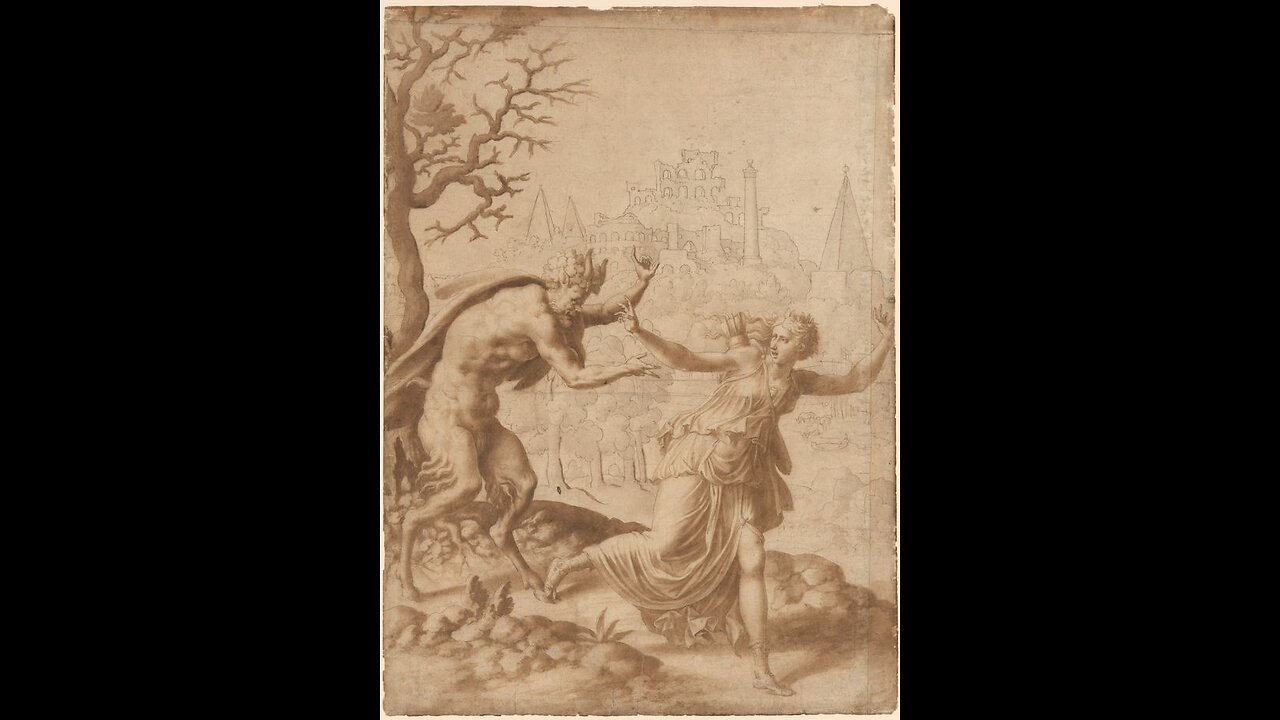Premium Only Content

"The Satyr" by Clark Ashton Smith
So in English, apparently it is most commonly accepted to use the long 'a' in Satyr, but the original Greek uses a sound closer to an English short 'a'. My physical book dictionary gives both pronunciations, but the long 'a' is listed first so is presumably preferred. It turns out I used both pronunciations in this story. I didn't even realize it while recording, it wasn't until edit that I caught myself going between the two. Oh well. Annoying, but such is the hazard of words with multiple acceptable pronunciations.
Ronsard: Pierre de Ronsard: 16th century French poet. Indeed, he was called by his contemporaries the Prince of Poets.
Pleiade: La Pléiade was a group of 16th century French Renaissance poets, including Ronsard, Joachim du Bellay, and Jean-Antoine de Baïf.
Helicon: A river in ancient Greece near the city of Dion in Pieria, which is reputed to have sank underground after the women who killed Orpheus wished to wash off in it the blood-stains.
villanelle: a nineteen-line poetic form consisting of five tercets followed by a quatrain. There are two refrains and two repeating rhymes, with the first and third line of the first tercet repeated alternately at the end of each subsequent stanza until the last stanza, which includes both repeated lines.
chrysolite: a usually greenish mineral that is a complex silicate of magnesium and iron
chrysoprase: an apple-green chalcedony valued as a gem
beldam: an old woman, especially a malicious and ugly woman (a witch!)
vertumnal: vernal, i.e. of, relating to, or occurring in the spring, or fresh or new like the spring
fain: now here's a fun word that means two completely opposite things! It can mean willing, or it mean to be compelled. It has other meanings besides, but one of those two is what we are looking for here, but which one is impossible to know. LOL!
aureole: a circle of light or brighting surrounding something
sovereign philtre: a curious phrase that is only used a tiny handful of times by several different authors, maybe 6 or 7 instances that google returns for me. They all use it in the same way, a love potion, but the fact that it only appears in these couple of stories and doesn't return any other results is curious. Even if I go with the spelling of "philter" instead, I get another two uses in other stories, so now 8 or 9 instances, but that's it. How odd, that this term was known just enough to be used by a handful of authors, but not used enough to get any sort of other results explaining what it is or where it derives from or any other information. Hmmm...
venerous: lustful, lascivious
mandragora: mandrake, which if you recall from Smith's story "The Mandrakes" from just the other day, was apparently an ingredient in love potions. If you aren't subscribed to the channel and didn't catch that story, be sure to look it up here to listen to next!
superannuate: obsolete or out-of-date
The picture used is "A Satyr Pursuing a Nymph"
To follow along: http://www.eldritchdark.com/writings/short-stories/214/the-satyr
So the ending of this version of the story is the alternate ending (http://www.eldritchdark.com/writings/short-stories/255/the-satyr-%28variant-conclusion%29). The original ending is the one shown in the earlier link. The original ending was seen as a bit to spicey for a 1930s audience... Murdering your adulterous wife was a-ok, people of the day apparently could relate to that, but having your unfaihtful wife be carried off by Pan? Nope, can't have that!
-
 47:44
47:44
CarlCrusher
14 hours agoUFO Psionic Contact Among Ancient Artifacts and REAL Dinosaur Tracks
1.15K -
 8:30
8:30
Gun Owners Of America
15 hours agoWe're Taking New York BACK To The Supreme Court
1.75K -
 1:01:50
1:01:50
SternAmerican
15 hours agoThe Nunn Report Election Integrity w/ Guest Steve Stern and Sam Anthony!
1.31K1 -
 8:01
8:01
BlackDiamondGunsandGear
6 months agoNew Canik Mete MC9
2.09K -
 1:00:02
1:00:02
PMG
16 hours agoJFK, War, & Health with Fox War Correspondent Hollie McKay
2.05K1 -
 2:37:51
2:37:51
Badlands Media
1 day agoDevolution Power Hour Ep. 338
120K43 -
 2:55:33
2:55:33
FreshandFit
9 hours agoAfter Hours w/ Stirling Cooper & Girls
66.5K74 -
 3:05:36
3:05:36
TimcastIRL
11 hours agoDHS Vows To HUNT DOWN Leftist Terrorists Amid SWATTINGS & Tesla TERROR w/Peter St Onge | Timcast IRL
258K184 -
 9:34:23
9:34:23
Dr Disrespect
19 hours ago🔴LIVE - DR DISRESPECT - WARZONE - 10 WINS IN A ROW EVENT
199K22 -
 43:23
43:23
Shaun Attwood
16 days agoSTEEPLES on Epstein Files Maxwell Meghan Markle Prince Harry... - AU 323 - Matthew Steeples
97.1K36